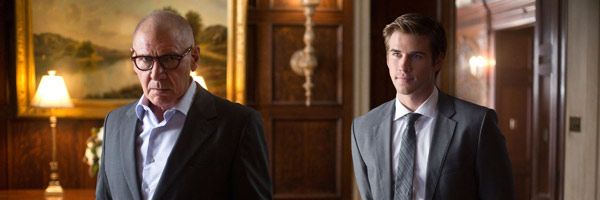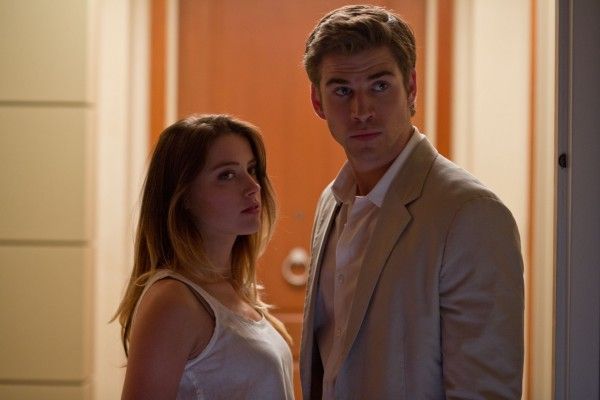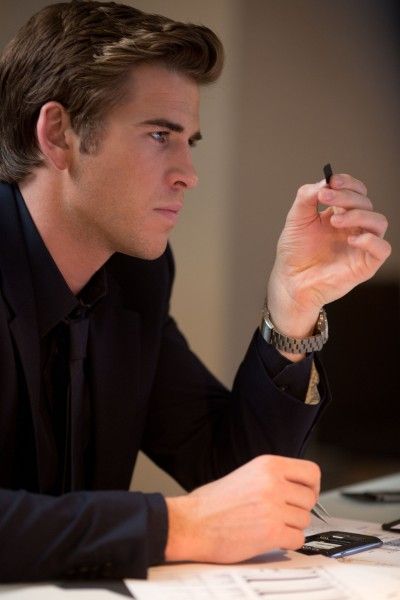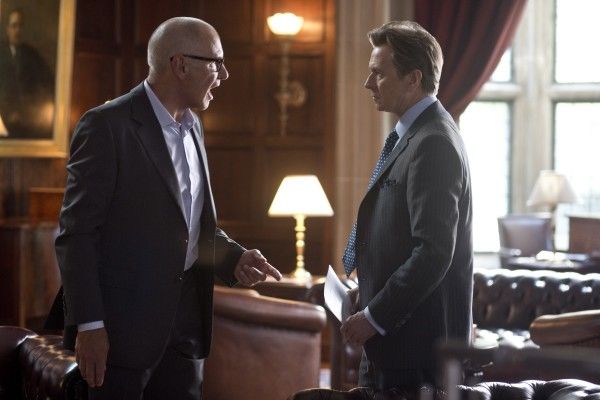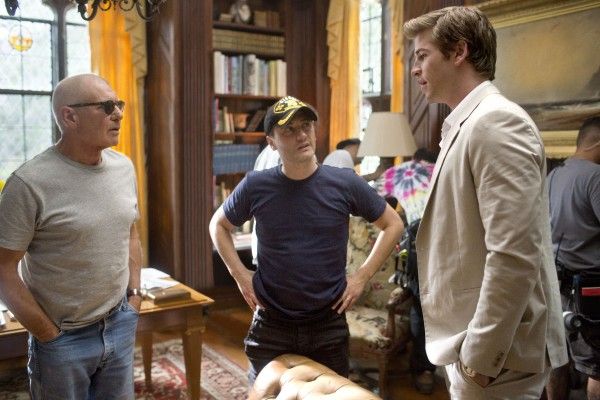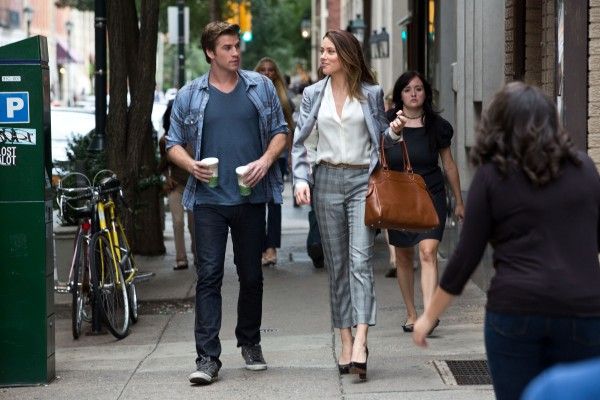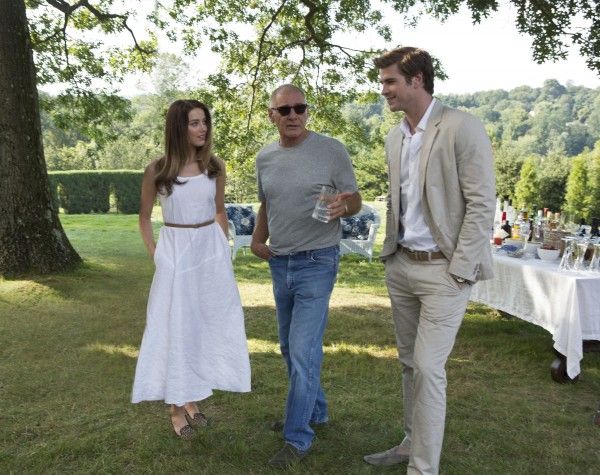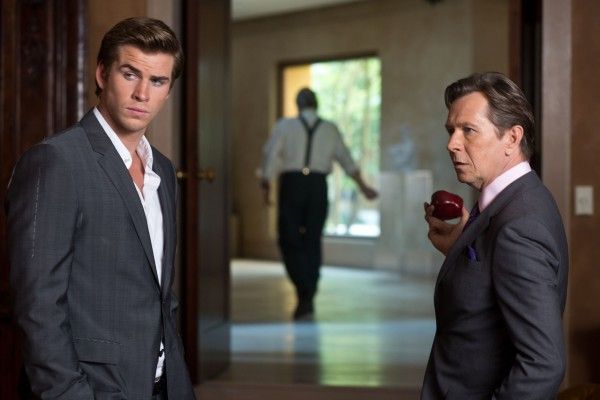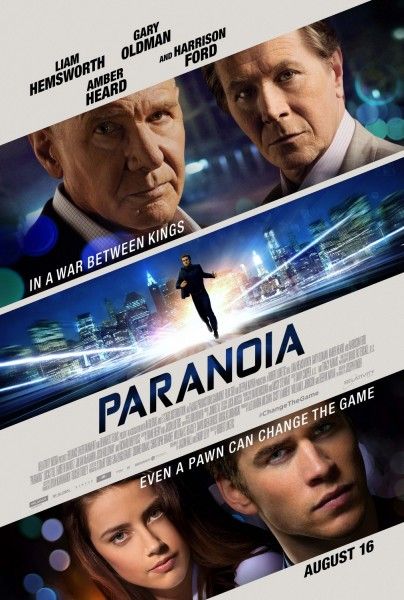Director Robert Luketic’s high stakes thriller, Paranoia, explores a deadly world of greed and deception in which two powerful, dueling global tech billionaires (Harrison Ford and Gary Oldman) with a complicated past will stop at nothing to destroy each other. An ambitious young superstar (Liam Hemsworth) becomes trapped in their dangerous game of corporate espionage only to realize that he’s in far too deep for them to let him walk away. Opening August 16th, the film also stars Gary Oldman, Amber Heard, Lucas Till, Embeth Davidtz, Julian McMahon, Josh Holloway and Richard Dreyfuss.
At the film’s recent press day, Luketic, Ford, Hemsworth, Heard and Till talked about updating the film adaptation based on the New York Times bestseller by Joseph Finder, what drew them to their characters, why the film’s underlying themes of connectivity, personal privacy and liberty are so relevant today, how the value of hard work has changed for the next generation, the complex relationship between ambition and morality, and their personal relationship with technology. Ford also discussed going toe-to-toe with Oldman and why his character’s mantra of “competition breeds innovation” doesn’t apply to acting. Read the full interview after the jump.
Question: Harrison, a big part of this film was shot at the Arbor Hill Estate near Philadelphia. How much did working in that environment of historic origins help inform your performance?
HARRISON FORD: I didn't work at the place you're talking about, though it's very impressive on screen, but I did have a very impressive home that Robert found for me which I think informed my characterization. The places where you see the character in his office and his home are important, so I cared a lot about that. The character that I played was created to help tell this story that we were telling, and the shades of his nature and how they were presented was part of the drama of the film. It was a great opportunity for me. I enjoyed being in the film, working with Robert and with Liam. It was a very good experience.
Liam, in a film that’s so much about freedoms being taken away in terms of individuality, crime and surveillance, how was it filming on the cobblestone streets of Philadelphia where the very heart of freedoms started?
LIAM HEMSWORTH: Philadelphia was great. I'd never been there before. It was interesting because it's like a smaller New York, but it's not as busy, and it's easier to shoot a film in. We had a great time there. It was just a good city. What's good about this film is that you're getting an insight into this day and age and how hard it is to keep things private, from your personal life to the internet, and how much information is able to be stolen so easily and so quickly. That's what this film gives you an insight into.
Amber, can you talk about what drew you to the role of Emma and do you share any traits in common with her?
AMBER HEARD: Part of why I like this character, Emma, is that she's her own woman. She's independent. She has a life outside of the relationship that she ends up being a part of. I tend to like that in characters -- a strength, an independence, a quality that sets them apart from their male counterparts, which is not the easiest thing to do in this business. When you can find a strong character and a director that does want to protect the integrity of all characters, female and male, then you have a good deal. That's what I found on this one.
HEMSWORTH: Amber's character in the film is extremely intelligent and a little scary, and I would say she's pretty close to that in real life.
ROBERT LUKETIC: She’s be reading books I couldn’t even pronounce the titles of.
HEMSWORTH: Yeah. She would come to set and she’d be reading some interesting book. I’d have conversations with Amber where she would just say things that I didn't understand. She would constantly make me feel just…
HEARD: It was those fashion magazines that I put…
HEMSWORTH: (laughs) Yeah, right. It was all a front. She's intelligent in real life. I'd say almost as intelligent as the character. (laughs) Just about.
So much of the movie is about being connected in today's modern world, would each of you be willing to share and characterize your own relationship with technology?
LUKETIC: It's a terrifying one. I was in Las Vegas yesterday, and I lost my iPhone, and I didn't have a passcode on it. This is a whole thing that’s going on right now. (to the actors) Don't worry you guys are all protected (laughs). Honestly, I've been an early adopter of technology since I was a kid. It's always been part of my life. It's always been there, and this movie really spoke to me. It’s something I've been thinking about since Twitter, and since Facebook, all this data gathering and data finding. When I read the script, I was like “Oh my god, this is so timely.” We didn't realize how timely it was, given what's happening with Snowden and all this information. I realize now how powerful it is, and it's interesting.
HEARD: I don't think we've caught up with regards to mechanisms to protect information at the same rate as our ability to gather that information. We haven't caught up with a way to protect it and harbor it, nearly as quickly as we've learned to gather it, and that's interesting. It could not be more relevant in terms of what's going on today with Snowden and Assange, and the whole idea of personal privacy and liberty, and how that conflicts, or can conflict, with a more omnipotent system of gathering, and what that says about individual liberties and how it's confronted with protections.
LUKETIC: There’s no privacy anymore, because everything you've ever written in an e-mail is now in a database, which was just uncovered this morning, if you read this morning's news. It’s horrifying.
HEARD: That's exactly what's so scary about it. That our personal liberties are always going to be somewhat in conflict with our necessity to be protected. And those two serve as enemies of one another, as we see right now with what’s going on with Snowden. It's an interesting question that’s very relevant right now.
FORD: One of the things that the film talks about which to me is the most interesting, because I'd always presumed there was no such thing as privacy, is that if you offer people something or create a perceived need or value in a service that you offer, people will forget about it. They will want that newest wrinkle in technology and will give up freedoms and personal privacy in order to have it. And that's the nature of marketing for these kinds of devices.
HEMSWORTH: What is interesting, too, is that one of the biggest threats these days is cyber warfare and how dangerous that is. They talk about terrorist groups hacking into power plants and all these things that are now run by computers, and everything's connected. We're all so connected by the internet and all this stuff, and all of a sudden, we don't have these things in place to protect it. We've advanced that technology so quickly that we haven't thought about all the other repercussions with it.
LUCAS TILL: It's probably better if I don't speak, actually (laughs).
For those of you who had a chance to work with Gary Oldman, what was it like? And especially Harrison, your face-off with him was pretty extraordinary, can you talk a little about that?
FORD: I worked with him, I guess it was about 20 years ago, on Air Force One, and when I knew that he was attached to this film, it was a big part of the draw. I had enjoyed very much working with him in Air Force One, and I was looking forward to the opportunity to work with him again. He's fun. You never know what he's going to do and what he's going to look like or who he's going to be.
LUKETIC: It’s intense.
FORD: I enjoyed it. We had a good time.
LUKETIC: Yeah. It was nice. Best time of my life.
HEMSWORTH: It was great to sit there and watch Harrison and Gary go head to head, particularly in those last few scenes when we were in the room together. In the scene, my character watches, and in real life I watched, and it was just very exciting. You don't know what either of them is going to do.
LUKETIC: When these guys got together in that face-off scene, there was literally this tension in the air. It was very palpable. It was fantastic and the highlight of my career, so far.
For Liam, this is a very different adult role for you. What did you love about getting to dig your toes into this guy?
HEMSWORTH: This is a completely different film than anything I've done before. What I initially related to was this kid has something that everyone can relate to. He's trying to climb the ladder. He’s starting at the bottom, and he's been at the bottom for a while, and he's fed up with being there. He's at the point where he's got big ideas and big hopes, and they don't get him anywhere. All of a sudden, he's caught in a position where he's being told to do something that he wouldn't normally do. And then, he starts going down this road, and he starts buying into the whole life, and the power, and he gets a taste for it. I like that he had something that everyone could relate to from the beginning. He wants to climb the ladder, he wants to be successful, and he gets pushed down a road that he wouldn't normally go down and finds himself in a pretty dangerous position. I've always liked thrillers like this, and I try to find characters that are going to challenge me. This is definitely one of those.
Harrison, you used the line “competition breeds innovation” several times in the film. I'm wondering if that phrase has ever applied to your own work and to your career?
FORD: The character's perceptions about competition creating innovation are appropriate to the story that we're telling and the world that he lives in. But you asked me something about acting, and that [phrase] doesn’t apply. Acting is not about competing. Acting is about cooperating. Acting is about collaboration. It's about your utility, your usefulness, your capacity to add to the work that has already been done and will be done. You're just part of a team. I never feel competitive about acting.
In the beginning, Liam's character talks about how it used to be that if you worked hard, you became successful. How do each of you see future generations of young kids coming up that want to be successful? How has the value of hard work changed?
LUKETIC: For me, there very much is a generation that, as we say in the movie, was promised a lot of things. If you went to college, you were going to get a great job. As we've seen with the economic downturn and the greed of certain sectors of the corporate world, it's not so. They call it a lost generation. You can call it whatever you want, but there is a youth, there is a movement that wants very much to offer hope and promise. The moral in our movie is not to go to the dark side, because ultimately that kind of cutthroat ruthlessness is not going to service you on a spiritual level. Don't do what those have done before you. That was the moral tale for Adam’s character and for me.
HEMSWORTH: In the end, Adam realizes that he has to get out with his wit and his intelligence, but also he has to do the right thing regardless of the consequences. You would like to hope that when you work hard at something, you get somewhere. I guess that's not always the case, but sticking to good morals and good values would be the key to it.
TILL: Hard work always wins in the end. I'd like to throw a reference about the movie, but I haven't actually seen it, so I'm at a loss.
LUKETIC: It’s because you’re busy.
TILL: Yeah. That’s why. I'll reiterate that hard work always wins. Say something funny, Lucas. Say something funny.
HEMSWORTH: How was X-Men? You just finished shooting X-Men, didn’t you?
TILL: Yeah, thanks for saving me. That was great. Next question.
I got the impression that this movie is more about ambition versus moral compass, rather than privacy or lack of privacy. Can you speak to how that works?
LUKETIC: It's tough. I approach my work and what I do as a good person. I like people that are good, that have good intentions. I believe you can be successful without having to sacrifice that position, and that's the character that I was attracted to in this piece. He does make very moral decisions. In fact, he betrays who he is. Essentially, he gives up everything that has anchored him and supported him in the world. He gives that up for this fantasy, this illusion, of what life on the other side of the river would be like. I found that it was an interesting dichotomy between all those things. It’s a complex question.
HEARD: I don't think that ambition and morality are mutually exclusive. It would be pedantic to assume that we have to choose between them, even in movies. We're compelled by characters that have to face such decisions.
LUKETIC: And, make mistakes. That are not black-and-white, that are not perfect.
HEARD: We have to struggle for everything, including our characters. They have to struggle as well. That’s what compels us to them. I don't think that ambition and morality need to be mutually exclusive, or are.
Amber, you play a strong female character, and one of the things that I like and think makes this film such a good thriller is that every character is strong. Earlier, you touched on what drew you to the role, can you elaborate on what you liked about your character?
HEARD: I was drawn to Emma because she's independent. She desires a future for herself that she, and only she, is responsible for. I love that she's trying to prove herself in a world that's not necessarily set up to accept her, or accept her easily. She's going into a field that is still very much a male-dominated world and she's doing so and relying on nothing but her own strength, her own wit, her own ability to succeed, and nothing else. She's not copping out in any way, and I liked that about her. Strength and independence are always something that I'm drawn to in all my characters, no matter how different they are from one another -- strength and a sense of independence, both in their character and in their position in the movie. Those are pretty much the standard things that I look for. I was drawn to Emma for that reason. Plus, Robert has a long history of directing women who stand on their own two feet. No matter what their individual characters are. They are all women that are not determined by how the male characters around them perceive them. He has a history of protecting us as women, so I felt like I was in good hands.
Harrison, your character stays close to the technology, but at the same time he needs younger inspiration to keep his business going. What was it like playing that character?
FORD: For me, a character is made up out of those things that help tell a story and my own experience which helps me string it all together. This is a character that's preceded in his appearance onscreen by a body of opinion about him -- who he is, what he is, how he's behaved in the past. I wanted my first appearance onscreen to complicate that. Robert was wonderfully collaborative about things like that. When I showed up with a shaved head, he was okay with that. When I said I wanted to wear blue jeans and a T-shirt to my fancy house backyard party, he was OK with that. Those are the kind of things which I use to help describe a complicated character. The guy's bad to the bone, but there's no fun in seeing that presented that way. I thought there were interesting opportunities in the construction of the script and the sophistication of the filmmakers that would allow me to create a character different to what I've played before.
LUKETIC: In that scene when Harrison’s character was first introduced, traditionally, there'd be some powerful shot of him walking into the room, and it was just very casual. He comes up to Adam, shakes his hand, and sits down. Here is this person we’ve been hearing about. So, in a way, that was fascinating, interesting and really great. And that came from Harrison. I liked that.
HEMSWORTH: You weren’t even wearing shoes, were you?
FORD: In the backyard? No. (laughs) He’s too rich.
You guys played with mobiles, electronics, and computers. Harrison, your character built radios. Did you grow up as tech or electronic nerds, or did you build anything when you were a kid, and where did you draw inspiration for that?
HEMSWORTH: My character has a scene where he takes apart a number of phones and does numerous things to them. So, when I found out that I was going to do this film, I got some old phones and I took them apart, and (laughs) that's about all I did. I took them apart and couldn't even put them back together. I wouldn't say that I'm as smart as Adam, in that way.
FORD: I grew up in the Stone Age.
LUKETIC: But you fly sophisticated jet aircraft.
FORD: That's a wonder in which I have developed some capacity because that's something I want to do. But, I don't want to be a slave to electronic devices. I don't want to be connected to my friends. I don't want to send snapshots of my dog and cute pictures of my family life to my friends and family. I don't want to be liked, by pushing a button. I use all of this technology to basically replace devices that I had in the past which worked just fine.
HEARD: Like smoke signals.
LUKETIC: Like pay phones.
FORD: Yeah. I don't really use it for very much. I like books. I don't like to read things on the internet. Anyways, I don't have much of a connection to it.
TILL: Do you remember those AM radio kits you get as a kid and you build your own AM radio? Well, I never actually built one. But I did get them as a gift, for like 3 Christmas's in a row, and I hated them. It's like guitar, anything that just takes too long. I’ve always had a grasp of technology, but it takes too much time for me to spend as much time as Kevin does in the movie tweaking things. I think me and Kevin definitely want to get laid just as bad. But as far as that's concerned, I don't think I share that much with the character.
Robert, could you comment on how the final film compared to what you originally envisioned?
LUKETIC: I've said this before, whenever I'm asked about this. For me movie making, especially in this day and age and on the budget-level we worked on, is a process of compromise. What is up here is expensive to put out. I always look at my movies and I see where the compromises are magnified, and remember, I've watched it a thousand times before I sat here in front of you. And so, I got the screenplay first and then I read the book. In terms of the adaptation to screen process, the book was written in a time when we weren't in this socioeconomic quandary that we're in now. There weren’t all of these issues, and the technology was not quite the monster that it became, because it was written in a different time. Part of the adaptation was about updating that, and I think we did a good job in that regard. In terms of the scale of what I wanted, and to be able to shoot in New York City and do all that kind of stuff, that's always a filmmaker’s pain. That's just part of life. I'm not one of those directors that get unlimited resources to make things with. But given what we had, I'm so proud of what this cast did. They’re extraordinary and that’s what makes the movie.

